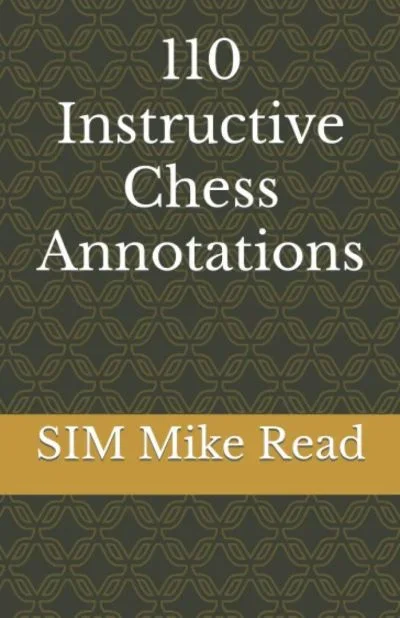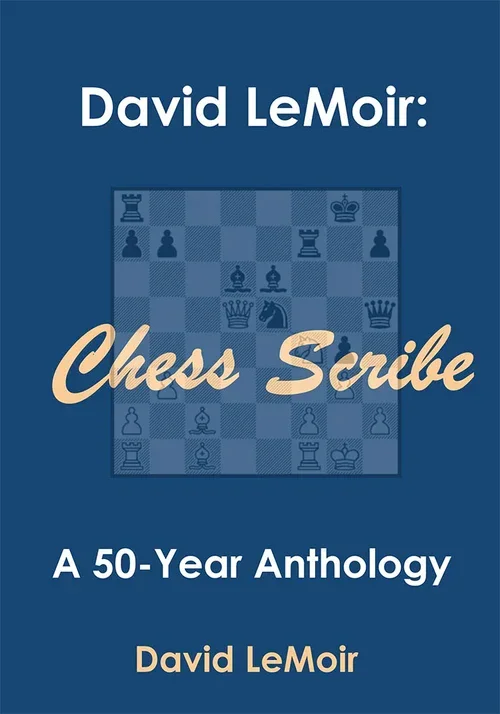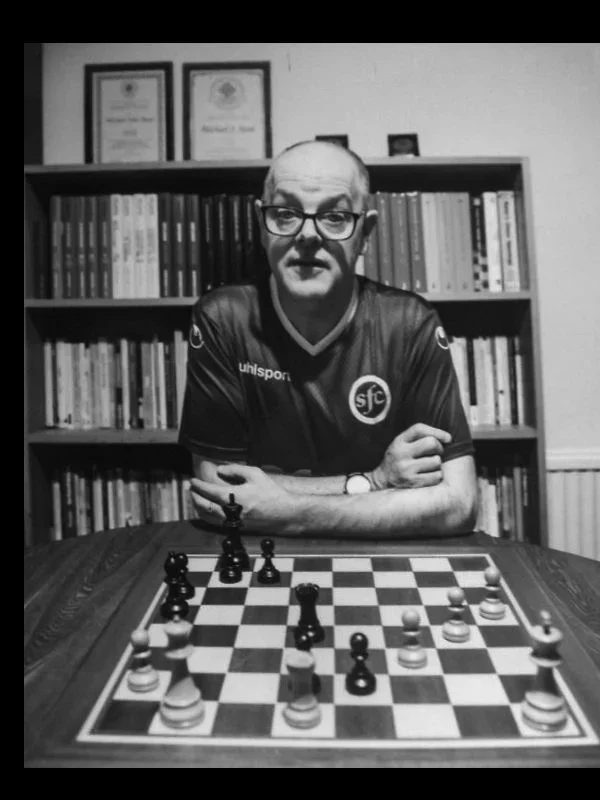
- LeMoir, David. David LeMoir, Chess Scribe: A 50-Year Anthology. Self-published, 2021. ISBN 978-1527291188, 272 pages. Available on Amazon.com.
- Read, Mike: 110 Instructive Chess Annotations. Self-published, 2021. ISBN 979-8466415964, 551 pages. Available on Amazon.com.
- Splane, Mike. Chess Wizardry: Thinking Outside the Box. Self-published, 2021. Freely available here. See also the July 2022 “My Best Move” in Chess Life for more of Splane’s writing.
Originally published in the October 2022 issue of Chess Life.
The history of self-published chess books is a rich one, encompassing countless obscure and long-forgotten manuscripts in every country. Over the years, I’ve seen numerous annotated games collections by amateur players, usually passed around to friends but never reaching a wider audience. There must be hundreds of these productions out there.
Obscurity is the rule. I have made my own forays into self-publication, and suspect, for example, that there are very few copies left of my self-collated 2nd Marshall International Chess Tournament, New York 1979. Nor of the first Chessman Comics (illustrated by Chris Hendrickson), which was churned out and stapled together in a local copy shop in Denver, then distributed by hand.
Today’s technology has considerably eased the process of self-publication, and all the messy details of layout, finding a printer, storage, distribution/advertising, and even the upfront costs of publication can be bypassed by using ChessBase and one of a number of online services. It’s also possible to avoid the print world entirely and go directly to ebook.

One of the books I’m reviewing here, David LeMoir, Chess Scribe: A 50-Year Anthology, is a collection of David LeMoir’s chess writings over 50 years. It includes an informative 2020 article “You Too Can Be a Chess Author,” which, in addition to describing some of the self-published books by his friends, gets into the details of self-publishing with Amazon’s direct publishing services. I can’t even guess how many chess books have been published this way — I count 109 Kindle ebooks by Tim Sawyer alone, for example.
Chess Scribe itself is self-published, but LeMoir has also written several entertaining books for Gambit Publishing: How to be Lucky in Chess, How to Become a Deadly Chess Tactician, and Essential Chess Sacrifices. Excerpts from these books are included in Chess Scribe, with the bulk of the material coming from his articles which appeared in the British magazines Chess and En Passant.
Part of the fun is reading about LeMoir’s experiences at Chess, where he worked briefly and became familiar with the legendary B.H. Wood, and En Passant, a local magazine which he took over himself. LeMoir clearly loves old chess books and chess history, and the anthology includes items such as his lengthy and informative tribute to the fellow Norwich-based writer and strong player Owen Hindle.
Chess Scribe consists of tournament reports, anecdotes, and instructional articles, among others types of chess material. Le Moir’s books are centered around tactics and practical play, and that applies to many of these writings as well. An example which illustrates both tactics and his love of chess literature is the following:
“Then I realized that I had seen the same tactic before...”
A typical LeMoir theme is the saving of lost positions, like this one by a 12-year-old Michael Adams:
Chess Life editor John Hartmann tells me that recently a number of players have been inspired to read older books written by masters in the pre-engine era, in order to gain a more ‘human’ understanding of how players think, uncluttered by the complex and counterintuitive improvements the engines offer. I suspect that even strong players grow tired of seeing dense analysis with moves that neither side would consider playing in a real over-the-board game, so this is a nice exercise which can benefit the practical player.
Two of the works considered here were written without the use of engines. The first is by Mike Read, a Senior International Correspondence Master who gave an overview of his career in two self-published books: My 120 Selected Correspondence Games and Triumph and Disaster (a second games collection).

His new book, 110 Instructive Chess Annotations, is a collection of games by players from Norfolk County, all first published in En Passant (the magazine described above). Read’s tone is instructive, emphasizing typical mistakes and strategic misunderstandings. And because of an ongoing medical frailty, he does not use computers in his analysis.
This can be seen as a bug or a feature, depending on one’s perspective. In his Foreword to 110 Instructive Chess Annotations, David LeMoir notes that Read “does not rely on a computer’s judgment of a position, which is often based on obscure tactical lines that few humans below Grandmaster level (and often not even a Grandmaster) would ever be able to reproduce. So he cannot fall into the trap that some modem authors fall into of occasionally giving random computer-generated variations and evaluations that they do not fully understand.”
While the games in Read’s collection are mostly by club players, a number of them include professionals. To wit: Read annotates a high-level game by local boy done good, GM John Emms:
Here’s a game by Read himself, with his notes. I’ve cut down on them for reasons of space, and added just a couple of improvements (in blue text) which an engine has no trouble spotting.
A final note about Read’s book: it, like all of his titles, is very inexpensive, running about $12 on Amazon for 500+ pages of content. Read says in the Introduction that he is forgoing royalties and selling at cost to allow more people to read them — an admirable gesture, and one that is only possible in a non-commercial situation.
The last book I’d like to mention, Chess Wizardry: Thinking Outside the Box, isn’t in print or kindle format, but is freely available as a PDF file on the web. The author, Mike Splane, died last year, and before he passed, he put together his annotated games and extensive thoughts about chess in Word files.

Splaine’s friends Dana Mackenzie and Ken Case edited these files, move-checked the games, and put the book into PDF format. Splane talks at great length about his theories of how to play chess, and has many opinions about chess principles, even inventing some new terminology to explain his ideas. He devotes time to pawn structures, defending, the endgame, the thinking process, and other topics.
Splaine, like Read, didn’t use ChessBase or an engine, so sometimes his notes are off base, but this gives them a casual feel which is easy for the average player to relate to. Here’s a game he was proud of, with his notes along with one of my own in blue:
Categories
Archives
- January 2026 (10)
- December 2025 (27)
- November 2025 (29)
- October 2025 (39)
- September 2025 (27)
- August 2025 (29)
- July 2025 (43)
- June 2025 (25)
- May 2025 (24)
- April 2025 (29)
- March 2025 (29)
- February 2025 (20)
- January 2025 (24)
- December 2024 (34)
- November 2024 (18)
- October 2024 (35)
- September 2024 (23)
- August 2024 (27)
- July 2024 (44)
- June 2024 (27)
- May 2024 (31)
- April 2024 (51)
- March 2024 (34)
- February 2024 (25)
- January 2024 (26)
- December 2023 (29)
- November 2023 (26)
- October 2023 (37)
- September 2023 (27)
- August 2023 (37)
- July 2023 (47)
- June 2023 (33)
- May 2023 (37)
- April 2023 (45)
- March 2023 (37)
- February 2023 (28)
- January 2023 (31)
- December 2022 (23)
- November 2022 (32)
- October 2022 (31)
- September 2022 (19)
- August 2022 (39)
- July 2022 (32)
- June 2022 (35)
- May 2022 (21)
- April 2022 (31)
- March 2022 (33)
- February 2022 (21)
- January 2022 (27)
- December 2021 (36)
- November 2021 (34)
- October 2021 (25)
- September 2021 (25)
- August 2021 (41)
- July 2021 (36)
- June 2021 (29)
- May 2021 (29)
- April 2021 (31)
- March 2021 (33)
- February 2021 (28)
- January 2021 (29)
- December 2020 (38)
- November 2020 (40)
- October 2020 (41)
- September 2020 (35)
- August 2020 (38)
- July 2020 (36)
- June 2020 (46)
- May 2020 (42)
- April 2020 (37)
- March 2020 (60)
- February 2020 (38)
- January 2020 (45)
- December 2019 (34)
- November 2019 (35)
- October 2019 (42)
- September 2019 (45)
- August 2019 (56)
- July 2019 (44)
- June 2019 (35)
- May 2019 (40)
- April 2019 (48)
- March 2019 (61)
- February 2019 (39)
- January 2019 (30)
- December 2018 (29)
- November 2018 (51)
- October 2018 (45)
- September 2018 (29)
- August 2018 (49)
- July 2018 (35)
- June 2018 (31)
- May 2018 (39)
- April 2018 (31)
- March 2018 (26)
- February 2018 (33)
- January 2018 (30)
- December 2017 (26)
- November 2017 (24)
- October 2017 (30)
- September 2017 (30)
- August 2017 (31)
- July 2017 (28)
- June 2017 (32)
- May 2017 (26)
- April 2017 (37)
- March 2017 (28)
- February 2017 (30)
- January 2017 (27)
- December 2016 (29)
- November 2016 (24)
- October 2016 (32)
- September 2016 (31)
- August 2016 (27)
- July 2016 (24)
- June 2016 (26)
- May 2016 (19)
- April 2016 (30)
- March 2016 (36)
- February 2016 (28)
- January 2016 (32)
- December 2015 (26)
- November 2015 (23)
- October 2015 (16)
- September 2015 (28)
- August 2015 (28)
- July 2015 (6)
- June 2015 (1)
- May 2015 (2)
- April 2015 (1)
- February 2015 (3)
- January 2015 (1)
- December 2014 (1)
- July 2010 (1)
- October 1991 (1)
- August 1989 (1)
- January 1988 (1)
- December 1983 (1)







